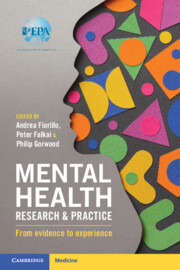Book contents
- Mental Health Research and Practice
- Mental Health Research and Practice
- Copyright page
- Contents
- Contributors
- Preface
- Chapter 1 Chemical and Behavioral Addictions
- Chapter 2 Nonsuicidal Self-Injury in Adolescents
- Chapter 3 Consultation-Liaison Psychiatry and Psychosomatics
- Chapter 4 Recent Developments in Cultural Psychiatry
- Chapter 5 New Perspectives in Eating Disorders
- Chapter 6 Emergency Psychiatry
- Chapter 7 How Can Forensic Psychiatry Contribute to Legal and Ethical Controversies in Society?
- Chapter 8 Diagnosis of Co-occurrent Mental Health Problems in Persons with Intellectual Disability, Major Communication and Insight Difficulties, and Stressor-Related Disorders
- Chapter 9 Attention Deficit Hyperactivity Disorder in Adults
- Chapter 10 Translational Neuroimaging in Psychiatry
- Chapter 11 Challenges in the Therapy of Psychiatric Disorders in the Elderly
- Chapter 12 Position-Taking
- Chapter 13 Physical Health of Patients with Schizophrenia
- Chapter 14 Evolving Concepts for the Assessment and Treatment of Schizophrenia
- Chapter 15 The Role of Rapid-Acting Antidepressants in Suicidal Crisis Management
- Chapter 16 Telemental Health Care
- Chapter 17 Development and Current Status of ICD-11 Mental, Behavioral, or Neurodevelopmental Disorders
- Chapter 18 Anxiety Disorders
- Chapter 19 Did We Lose Interest and Pleasure in the Concept of Major Depression?
- Chapter 20 Personality Disorders
- Index
- References
Chapter 11 - Challenges in the Therapy of Psychiatric Disorders in the Elderly
Published online by Cambridge University Press: 01 February 2024
- Mental Health Research and Practice
- Mental Health Research and Practice
- Copyright page
- Contents
- Contributors
- Preface
- Chapter 1 Chemical and Behavioral Addictions
- Chapter 2 Nonsuicidal Self-Injury in Adolescents
- Chapter 3 Consultation-Liaison Psychiatry and Psychosomatics
- Chapter 4 Recent Developments in Cultural Psychiatry
- Chapter 5 New Perspectives in Eating Disorders
- Chapter 6 Emergency Psychiatry
- Chapter 7 How Can Forensic Psychiatry Contribute to Legal and Ethical Controversies in Society?
- Chapter 8 Diagnosis of Co-occurrent Mental Health Problems in Persons with Intellectual Disability, Major Communication and Insight Difficulties, and Stressor-Related Disorders
- Chapter 9 Attention Deficit Hyperactivity Disorder in Adults
- Chapter 10 Translational Neuroimaging in Psychiatry
- Chapter 11 Challenges in the Therapy of Psychiatric Disorders in the Elderly
- Chapter 12 Position-Taking
- Chapter 13 Physical Health of Patients with Schizophrenia
- Chapter 14 Evolving Concepts for the Assessment and Treatment of Schizophrenia
- Chapter 15 The Role of Rapid-Acting Antidepressants in Suicidal Crisis Management
- Chapter 16 Telemental Health Care
- Chapter 17 Development and Current Status of ICD-11 Mental, Behavioral, or Neurodevelopmental Disorders
- Chapter 18 Anxiety Disorders
- Chapter 19 Did We Lose Interest and Pleasure in the Concept of Major Depression?
- Chapter 20 Personality Disorders
- Index
- References
Summary
With the Decade of Healthy Ageing, the WHO has placed a focus on the care of old people. The paper focuses on four key issues that are important for better care of mental health problems in old age. First, behavioral disorders (BPSD) are common in dementia and are a cause of physical, psychological, and social complications. Their management plays a major role. The second article is about the field of neurostimulation, which has been rediscovered in recent years. ECT in particular is very well tolerated by older patients and also by physically ill patients. Other forms of neurostimulation are now being tested. The third article is dedicated to the aim of reducing irrational polypharmacy in old age, which not only contributes to cognitive deterioration but also to increased mortality and fall rates. A relatively new approach is the development of collaborative care structures involving clinical pharmacologists. The last contribution is dedicated to digitalization, which has many advantages, especially in the care of the elderly. The lack of (geriatric) psychiatric care can be partly compensated by the fact that the internet or internet-based help can reach every region (of the world).
Keywords
- Type
- Chapter
- Information
- Mental Health Research and PracticeFrom Evidence to Experience, pp. 177 - 196Publisher: Cambridge University PressPrint publication year: 2024



